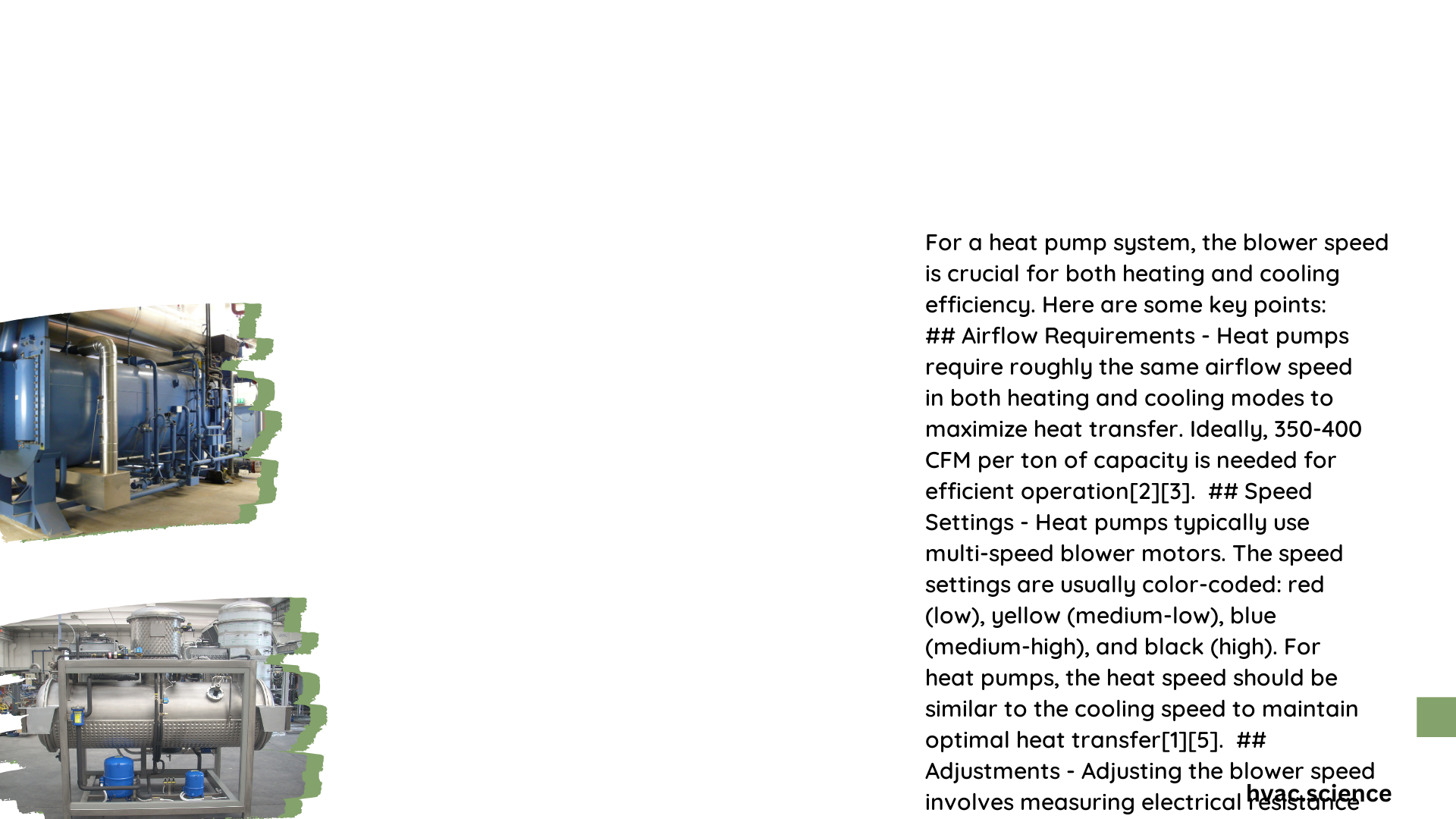Heat pump blower speed is a critical factor in HVAC system performance, affecting energy efficiency, comfort, and indoor air quality. Proper blower speed settings ensure optimal airflow, typically measured in cubic feet per minute (CFM), which directly impacts the heat pump’s heating and cooling capacity. Understanding and adjusting blower speed is essential for maintaining system efficiency and prolonging equipment lifespan.
What Are the Optimal Heat Pump Blower Speed Settings?
The optimal blower speed for heat pumps varies depending on the system’s capacity and specific requirements. Here are some general guidelines:
- CFM per Ton: A common rule of thumb is to use approximately 400 CFM per ton of cooling/heating capacity.
- System-Specific Settings: For ECM multi-speed blower motors, speeds are typically set based on the system’s BTU rating.
| System Capacity | Recommended Blower Speed |
|---|---|
| 2-ton (24,000 BTU) | 800 CFM |
| 3-ton (36,000 BTU) | 1200 CFM |
| 4-ton (48,000 BTU) | 1600 CFM |
It’s important to note that these are general recommendations, and the actual optimal settings may vary based on factors such as duct design, static pressure, and specific manufacturer guidelines.
How to Adjust Heat Pump Blower Speed?

Adjusting the blower speed on a heat pump requires careful attention to detail and adherence to safety protocols. Here’s a step-by-step guide:
- Identify the Blower Motor Type
-
Determine if it’s an ECM variable speed, ECM constant torque/multi-speed, or a PSC blower motor.
-
Locate the Control Board
-
Find the control board where adjustments are typically made for ECM blower motors.
-
Measure Resistance (if applicable)
-
For some motors, measure resistance between different wires to determine speed settings.
-
Adjust the Wires
-
Move colored wires to appropriate terminals on the control board to change blower speed.
-
Verify CFM
-
Measure total static pressure (TESP) and compare to manufacturer’s airflow data sheet.
-
Ensure Power is Off
- Always turn off power before making adjustments to prevent electrical hazards.
What Are Common Troubleshooting Techniques for Blower Speed Issues?
When encountering problems with heat pump blower speed, consider these diagnostic methods and solutions:
Diagnostic Methods:
- Check wire connections
- Measure TESP
- Verify temperature differences across the coil
Potential Causes and Solutions:
- Incorrect Wire Configuration
- Cause: Wires connected to wrong terminals
- Solution: Correct wire connections using the wire diagram
-
Estimated Time: 15-30 minutes
-
Low Indoor Airflow
- Cause: Insufficient CFM or high static pressure
- Solution: Adjust blower speed to match system requirements
-
Estimated Time: 15-30 minutes
-
Poor Duct Design
- Cause: Restrictive ductwork reducing airflow
- Solution: Modify or replace ductwork to reduce static pressure
- Estimated Time: Several hours to days
How Does Blower Speed Affect System Performance?
The blower speed settings have significant impacts on various aspects of HVAC system performance:
Indoor Air Quality
- Higher CFM: Improves air circulation but may increase dust circulation
- Lower CFM: May lead to higher indoor humidity and reduced air circulation
Noise Levels
- Higher CFM: Generally increases blower noise
- Lower CFM: Reduces noise but may compromise system performance
System Longevity
- Optimal CFM: Ensures system operates within designed parameters, reducing wear and tear
- Inconsistent CFM: Can lead to increased energy consumption and shorter component lifespan
What Are the Key Considerations When Setting Heat Pump Blower Speed?
When adjusting heat pump blower speed, keep these factors in mind:
- System Capacity: Match CFM to the heat pump’s tonnage
- Static Pressure: Ensure ductwork can handle the set CFM
- Comfort Levels: Balance between airflow and noise
- Energy Efficiency: Optimize for best performance without excessive energy use
- Humidity Control: Adjust for proper dehumidification in cooling mode
By carefully considering these factors and following manufacturer guidelines, you can optimize your heat pump’s blower speed for maximum efficiency and comfort.
References:
1. https://www.youtube.com/watch?v=f79rrGsWNvM
2. https://www.acservicetech.com/post/adjusting-airflow-speed-on-an-ecm-blower-motor
3. https://forum.heatinghelp.com/discussion/158724/how-do-you-know-the-best-fan-speed-for-a-c
